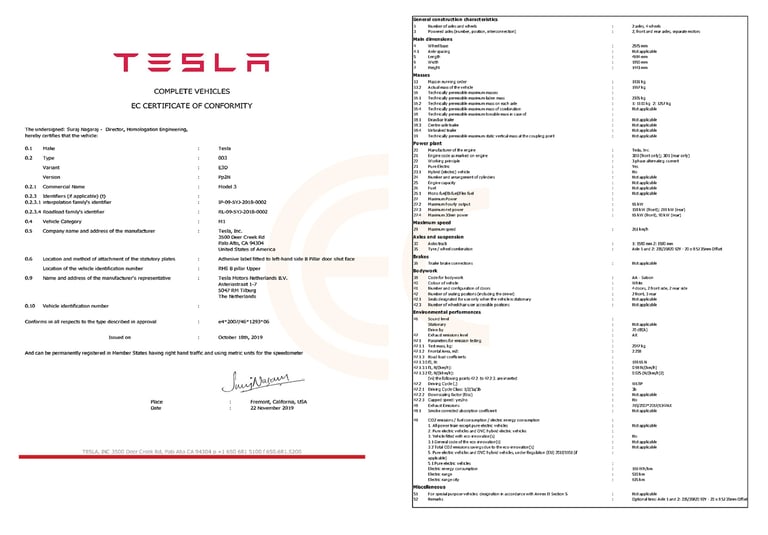Get your Tesla COC duplicates today!
COC vs. Certificate of Analysis (COA) for Your Tesla: Understanding the Critical Difference
TESLA COC TEAM
7/31/20253 min read


When dealing with a high-tech vehicle like a Tesla, especially across international borders or for specific regulatory needs in the US and Europe, you'll encounter various certifications. Two terms that often cause confusion are the Certificate of Conformity (COC) and the Certificate of Analysis (COA).
While both are "certificates" that relate to compliance and quality, they serve distinct purposes and are used in very different contexts. For Tesla owners, importers, and enthusiasts, understanding this difference is crucial to avoiding delays and ensuring seamless vehicle registration and operation.
Let's break down what each means, particularly in the world of Tesla vehicles.
What is a Certificate of Conformity (COC) for Your Tesla?
For a Tesla (or any vehicle), the Certificate of Conformity (COC) is the document you'll primarily be concerned with.
Issued By: The vehicle manufacturer (Tesla, in this case).
Purpose: It's a formal declaration by Tesla that a specific vehicle, identified by its unique Vehicle Identification Number (VIN), was manufactured in conformity with the relevant type-approval regulations and technical standards of a given economic area.
What it Certifies: For Teslas in Europe, an EC COC confirms the vehicle meets all European Union-wide homologation standards (e.g., EC Whole Vehicle Type Approval - EC-WVTA). This includes compliance with environmental (emissions), safety, and technical requirements. For US-spec Teslas, while a direct "COC" isn't always the primary term used for federal compliance, the Manufacturer's Certificate of Origin (MCO) and adherence to FMVSS serve a similar overarching purpose of proving manufacture to specific standards.
Key Information: Your Tesla's COC will detail specifications like its dimensions, weight, power output, tire sizes, noise levels, and sometimes even its original CO2 emissions (or equivalent for EVs) and the specific EU directives it complies with.
When You Need It: Absolutely essential for registering your Tesla in a European country, especially if it's imported from outside the EU/EEA, or when moving your vehicle between certain EU member states. It's the "passport" that proves your Tesla is legally compliant for road use in Europe. It also helps immensely when importing a Tesla from Europe to the US by outlining the precise specifications.
In short: A COC is a declaration that the entire vehicle as a product conforms to a set of predefined regulations and standards for its intended market.
What is a Certificate of Analysis (COA)?
A Certificate of Analysis (COA) serves a very different function and is generally not relevant to the overall vehicle's registration or type approval.
Issued By: Typically, a laboratory or a supplier of specific materials, components, or chemicals.
Purpose: It's a document that details the results of specific tests performed on a particular batch or lot of a raw material, chemical compound, or even a finished component. It verifies that these specific items meet defined quality specifications, purity levels, or composition requirements.
What it Certifies: For instance, a COA might confirm the purity of a batch of lithium for battery production, the chemical composition of a specific lubricant, or the material properties of a batch of specialized steel used in a certain part.
Key Information: A COA will list the exact test methods used, the specific parameters tested (e.g., chemical composition, purity, moisture content, tensile strength), and the actual measured results for that specific batch.
When You'd See It (Indirectly for Tesla Owners): As a Tesla owner, you would almost certainly never directly request or need a COA for your vehicle. COAs are internal documents within the manufacturing supply chain. Tesla's suppliers would provide COAs for the raw materials and components they deliver to Tesla to ensure those inputs meet Tesla's stringent quality and safety standards before being integrated into your car.
In short: A COA provides detailed analytical test results for a specific batch of material or component, confirming its quality and composition, usually in a B2B supply chain context.
Key Differences at a Glance: Tesla-Specific
Feature
Certificate of Conformity (COC)
Certificate of Analysis (COA)
What it Certifies
The entire vehicle meets type-approval regulations for road use.
A batch of material/component meets quality specs/purity.
Issued By
Tesla (the vehicle manufacturer)
A lab or supplier of raw materials/parts to Tesla
For Whom
Vehicle owner, importer, registration authorities
Tesla's procurement/quality control departments
When You Need It
Vehicle registration (especially in Europe), import/export.
Internal supply chain verification during manufacturing.
Level of Detail
Broad compliance declaration with key technical specs.
Detailed, specific analytical test results for a batch.
Relevance to You
Crucial for legal ownership and operation.
Not directly relevant to you as a Tesla owner.
Why This Distinction Matters for You
Confusing a COC with a COA can lead to significant frustration. If you're asked for a "certificate" for your Tesla, it's almost certainly a Certificate of Conformity that's needed for registration or import purposes. Attempting to provide a COA (which you wouldn't typically have anyway) would be entirely irrelevant to the authorities and cause delays.
As specialists in Tesla COC certification for the US and European markets, we bridge this knowledge gap. We ensure you understand exactly which documents your Tesla requires and, more importantly, we streamline the process of obtaining your official Certificate of Conformity.
Don't let regulatory jargon slow down your Tesla's journey.
Contact our Tesla COC experts today to ensure you have the right documents for seamless compliance in the US or Europe!
Trustworthy
Fast and reliable Tesla COC duplicates for Europe.
Secure
Payment
support@teslacoc.com
+31670159339
© 2025. All rights reserved.
LINKS